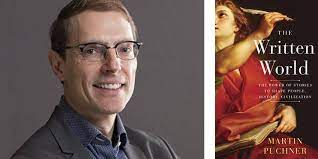
I enjoy literary history and Martin Puchner’s The Written World tells the story of how writing spread around the world. Puchner takes a world-wide approach to his subject and provides insights I was not aware of despite my decades of reading and studying Literature.
The first surprise was that Alexander the Great spread writing in very country he conquered. His favorite book was The Iliad which he carried everywhere he traveled. Puchner surmises Alexander the Great was inspired by the events in The Iliad and they led him to his conquests.
I knew about book piracy and the fake “sequels” to Don Quixote but I had no idea of the extent of the practice until Puchner enlightened me. I was also aware of Benjamin Franklin’s important work spreading printing presses throughout the new United States, but again the extent of Franklin’s efforts astonished me.
My favorite chapter in The Written World is Chapter 13. I’m a huge fan of Isaiah Berlin and I’ve read many of his books. But, I did not know the story of Berlin traveling to Russia to meet with the banned poet Anna Akhmatova. The weight of the Soviet Government landed on Akhmatova reducing her to poverty despite her world-class reputation. Berlin spent a couple of days with Akhmatova in her squalid hovel–Puchner hints some romantic incident may have occurred–and Berlin later championed Akhmatova in the Western World. I knew Berlin operated as a diplomat for the British Government, but I had no idea he was also a spy.
If Literary History excites you as much as it does me, give The Written World a look. GRADE: A
Table of Contents:
Introduction: Earthrise — xi
Map and Timeline of the Written World — xxiv
Chapter 1: Alexander’s Pillow Book — 3
Chapter 2: King of the Universe: Of Gilgamesh and Ashurbanipal — 24
Chapter 3: Ezra and the Creation of Holy Scripture — 46
Chapter 4: Learning from the Buddha, Confucius, Socrates, and Jesus — 62
Chapter 5: Murasaki and The Tale of Genji: The First Great Novel in World History — 98
Chapter 6: One Thousand and One Nights with Scheherazade — 121
Chapter 7: Gutenberg, Luther, and the New Public of Print — 145
Chapter 8: The Popol Vuh and Maya Culture: A Second, Independent Literary Tradition — 171
Chapter 9: Don Quixote and the Pirates — 193
Chapter 10: Benjamin Franklin: Media Entrepreneur in the Republic of Letters — 211
Chapter 11: World Literature: Goethe in Sicily — 232
Chapter 12: Marx, Engels, Lenin, Mao: Readers of The Communist Manifesto, Unite! — 252
Chapter 13: Akhmatova and Solzhenitsyn: Writing Against the Soviet State — 272
Chapter 14: The Epic of Sunjata and the Wordsmiths of West Africa — 290
Chapter 15: Postcolonial Literature: Derek Walcott, Poet of the Caribbean — 306
Chapter 16: From Hogwarts to India — 326
Acknowledgements — 339
Notes — 341
Illustration Credits — 389
Index — 393
Sounds interesting. I had vague awareness of the examples you cite (though mostly about Berlin’s activities, for example, rather than specific interaction with Akhmatova).
Todd, I didn’t know about all of Berlin’s secret activities so this story about Akhmatova came as a revelation.